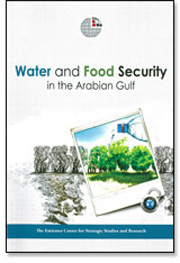Book contents
- Frontmatter
- Contents
- Figures and Tables
- Abbreviations and Acronyms
- Foreword
- Introduction
- Keynote Addresses
- Water Security in a Changing World
- Water Security in the Arabian Gulf Region
- 3 The Geopolitics of Water Scarcity
- 4 Water Security in the GCC Countries
- Water Resource Management in the Arabian Gulf Region
- Regional and International Food Security
- Water and Food Security in the UAE
- Contributors
- Notes
- Bibliography
- Index
3 - The Geopolitics of Water Scarcity
from Water Security in the Arabian Gulf Region
Published online by Cambridge University Press: 05 September 2014
- Frontmatter
- Contents
- Figures and Tables
- Abbreviations and Acronyms
- Foreword
- Introduction
- Keynote Addresses
- Water Security in a Changing World
- Water Security in the Arabian Gulf Region
- 3 The Geopolitics of Water Scarcity
- 4 Water Security in the GCC Countries
- Water Resource Management in the Arabian Gulf Region
- Regional and International Food Security
- Water and Food Security in the UAE
- Contributors
- Notes
- Bibliography
- Index
Summary
The severe scarcity of freshwater in the Arabian Peninsula has forced the GCC countries to turn to the sea for a solution, rather than to other countries, near or far. They have chosen to desalinate seawater and ground water in order to ensure their supply, largely as a result of their geo-climatic and geopolitical settings. The hydrological reasons are self-evident, but the geopolitical considerations are the focus of this chapter. It will investigate the geopolitics of water scarcity in the Middle East, with a particular focus on what it means for the Gulf states. It will also discuss the political and security risks of reliance on desalination plants and on water imports.
Conceptually, the approach is one of geopolitics and security. Geopolitics is concerned with developing a spatial or geocentric understanding of the whole by studying specific components and mechanisms such as relative location and asymmetric endowments of countries, which in turn affect relative power and relations among states. For Klare, geopolitics is about competition between current and aspiring great powers “for control over territory, resources, and important geographical positions, such as ports and harbors, canals, river systems, oases, and other sources of wealth and influence.” Geopolitics can be illustrated in numerous ways, including as a strategic map showing the “flows of vital resources linking regions and exposing their vulnerability and interdependence.”
The Arab world is located in a generally arid region, and conditions have been getting worse for the people there.
- Type
- Chapter
- Information
- Water and Food Security in the Arabian Gulf , pp. 61 - 80Publisher: Emirates Center for Strategic Studies and ResearchPrint publication year: 2013

